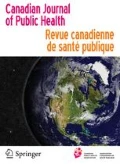Abstract
Refugees fall under the umbrella term of immigrants. Whereas immigrants chose to leave their host country for positive reasons, refugees are pushed out due to war and fear of persecution. The work they pursue does not align with their education and experience and oftentimes leaves them vulnerable to increased health and safety hazards causing musculoskeletal disorders (MSDs). Current publicly available resources and guidelines ignore their unique psychosocial profiles and homogenize refugees with all other workers. The resultant consequences are not only of concern to refugees but to healthcare providers, employers, and insurance companies as well as policymakers alike. A focus on the complex ways in which MSDs interact with refugee resettlement should be reflected in future MSD prevention guidelines to promote refugee health and well-being and advance Canada’s mandate to provide a safe, secure, and humane refugee program.
Résumé
Le réfugié est décrit par le terme général d’immigrant. Alors que l’immigrant a choisi de quitter son pays d’origine pour des raisons positives, le réfugié en a été expulsé à cause de la guerre et de la crainte d’une persécution. Le travail qu’il cherche ne correspond pas à son éducation et son expérience et le laisse souvent plus susceptible aux risques pour la santé et la sécurité, ce qui cause des troubles musculosquelettiques (TMS). Les ressources et lignes directrices publiques actuelles ignorent leur profil psychologique unique et assimilent les réfugiés aux autres travailleurs. Les conséquences qui en résultent sont préoccupantes non seulement pour les réfugiés, mais pour les fournisseurs de soins de santé, pour les employeurs, les assureurs, ainsi que pour les décideurs politiques. Les lignes directrices futures sur la prévention des TMS doivent tenir compte des façons complexes dont ces TMS interagissent avec la réinstallation d’un réfugié afin d’améliorer sa santé et son bien-être et de faire progresser le mandat du Canada en vue d’offrir aux réfugiés un programme humain et dans des conditions de sécurité physique et matérielle.
Similar content being viewed by others
References
Centre of Research Expertise for the Prevention of Musculoskeletal Disorders (CRE-MSD) (n.d.). Development of a new MSD prevention guide for Ontario, 2016–2018. Waterloo: CRE-MSD.
El-Gabalawy, H. (2014). Institute of Musculoskeletal Health and Arthritis Strategic Plan 2014–2018. Ottawa: Canadian Institutes of Health Research.
Kosny, A., & Lifshen, M. (2011). Review of safety resources for recent immigrants entering the Canadian workforce. Toronto: Institute for Work and Health.
Kosny, A., Lifshen, M., MacEachen, E., Smith, P., Jafri, G. J., et al. (2011). Delicate dances: immigrant workers’ experiences of injury reporting and claim filing. Toronto: Institute for Work and Health.
Krahn, H., Derwing, T., Mulder, M., & Wilkinson, L. (2000). Educated and underemployed: refugee integration into the Canadian labour market. Revue de Integration de la Migration International, 59–84.
Lamba, N. K., & Krahn, H. (2003). Social capital and refugee resettlement: the social networks of refugees in Canada. Journal of International Migration and Integration, 336–360.
MFL Occupational Health Centre (2017). First language health & safety training for newcomers, a project of the MFL Occupational Health Centre (OHC). Winnipeg: WCB.
Newbold, B. (2005). Self-rated health within the Canadian immigrant population: risk and the health immigrant effect. Social Science & Medicine, 60(6), 1359–1370.
Sienkiewicz, H. C., Mauceri, K. G., Howell, E. C., & Bibeau, D. L. (2013). Untapped resources: refugee employment experiences in Central North Carolina. Work, 45(1), 17–24.
Stewart MJ, Makwarimba E, Beiser M, Newfeld A (2010) Social support and health: immigrants’ and refugees’ perspectives. Diversity in Health Care, 7, 91–103.
Syed, I. U. B. (2014). Chronic illness among immigrant workers in Canada: An overview of existing knowledge. In S. D. Stone, V. A. Crooks, & M. Owens (Eds.), Working bodies: chronic illness in the Canadian workplace. Montreal: Mc-Gill-Queen’s University Press.
Syed, I., & Ahmad, F. (2016). A scoping literature review of work-related musculoskeletal disorders among South Asian immigrant women in Canada. Journal of Global Health, 6(2), 28–34.
Thurston, W., & Verhoef, M. (2003). Occupational injury among immigrants. Journal of International Migration and Integration, 4(1), 105–124.
UNHCR (2015). Global trends forced displacement in 2015. Geneva: UNHCR.
Wilkinson, L., & Garcea, J. (2017). The economic integration of refugees in Canada: a mixed record? Washington DC: Migration Policy Institute.
Author information
Authors and Affiliations
Corresponding author
Rights and permissions
About this article
Cite this article
Senthanar, S. Work-related musculoskeletal risk among refugees: recommendations for improvement to promote health and well-being. Can J Public Health 109, 459–463 (2018). https://doi.org/10.17269/s41997-018-0122-x
Received:
Accepted:
Published:
Issue Date:
DOI: https://doi.org/10.17269/s41997-018-0122-x




